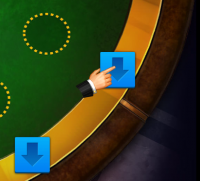Table of Contents
Blackjack
To play Blackjack, find a table in any casino and you can begin play instantly. Unlike poker, the system matches you with other players automatically, although if you wish to join a specific table you may do so via the TABLES menu button from within the Blackjack screen. You can play Blackjack with up to 4 other players at one table.
If you haven't played Blackjack before, you may wish to review its rules.
Sitting at a Table
Shortcuts
| Key | Description |
|---|---|
| Space | Stand. |
| H | Hit. |
| D | Double. |
| P | Split. |
| B | Bet. |
| R | Rebet. |
| Y | Yes. |
| N | No. |
Basic Blackjack Rules and Playstyle
Blackjack is played with one or more standard 52-card decks, with each denomination assigned a point value. The cards 2 through 10 are worth their face value. Kings, queens, and jacks are each worth 10, and aces may be used as either 1 or 11. The object for the player is to draw cards totaling closer to 21, without going over, than the dealer's cards.
The best total of all is a two-card 21, or a blackjack. Blackjack pays 3-2–that is, a two-card 21 on a 50 Chip bet will win 75 Chips instead of the usual 50 Chips even-money payoff on other winning hands. However, if the dealer also has a two-card 21, the hand pushes, or ties, and you just get your original bet back. But if the dealer goes on to draw 21 in three or more cards, your blackjack is still a winner with its 3-2 payoff.
Hit: If you hit, you take another card or cards in hopes of getting closer to 21. If the player's total exceeds 21 after hitting, the player is said to “bust” and loses the bet.
Stand: If you stand, you elect to draw no more cards in hopes that the current total will beat the dealer.
Double down: You may elect to double your original bet and receive only one more card regardless of its denomination. You Cannot then Hit Again After
Split: If your first two cards are of the same denomination, you may elect to make a second bet equal to your first and split the pair, using each card as the first card in a separate hand. For example, if you are dealt two 8s, you may slide a second bet equal to the first to your bet. The dealer will separate the 8s, then put a second card on the first 8. You play that hand out in normal fashion until you either stand or bust; then the dealer puts a second card on the second 8, and you play that hand out.
Insurance: If the dealer's faceup card is an ace, you may take “insurance,” which essentially is a bet that the dealer has a 10-value card down to complete a blackjack. Insurance, which may be taken for half the original bet, pays 2-1 if the dealer has blackjack. The net effect is that if you win the insurance bet and lose the hand, you come out even. For example, the player has 18 with a 100 Chip bet down. The dealer has an ace up. The player takes a 50 Chip insurance bet. If the dealer has blackjack, the player loses the 100 Chip bet on the hand but wins 100 Chip with the 2-1 payoff on the 50 Chip insurance bet.
